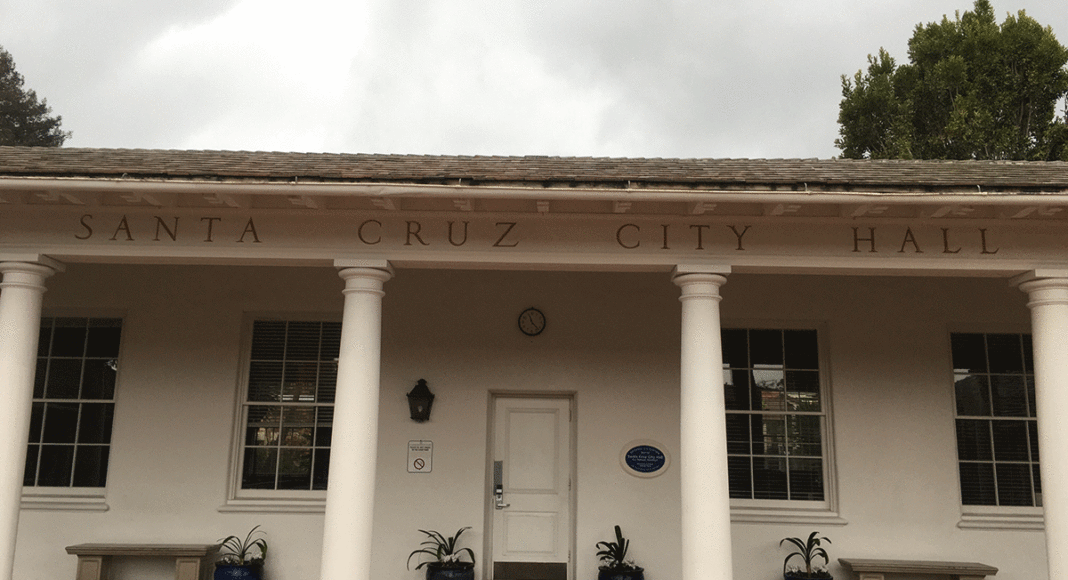A proposed half-cent sales tax that the city of Santa Cruz says is needed to offset the economic downturn of the last 15 months failed to find its way to the ballot—temporarily, at least—after a City Council member on Tuesday blasted her peers for a “systemic lack of interest in supporting our lowest-paid workers.”
City Councilwoman Sandy Brown was the lone “no” vote on a resolution to place a general sales tax on the Nov. 2 ballot, tanking an opportunity that the rest of the council championed as a way for the city to stabilize its finances and more quickly rebound from the pandemic. The City Council needed a unanimous vote on the item because it was declaring a fiscal emergency, according to state law.
Brown called the tax “regressive” and worried that it would ultimately hurt “poor people.” But she said that she was willing to support it if her fellow council members considered prioritizing a portion of the projected revenues—roughly $6 million annually—to help move the city’s low-level employees toward a living wage, an issue that she has long campaigned for.
Several council members said that because the proposed hike—which would raise the city’s tax rate to 9.75%, tying Scotts Valley for the highest rate in the county—is a general tax, the City Council could not determine how those funds would be ultimately used. But City Councilmember Justin Cummings amended the proposed four-part motion to direct staff to bring back a preferred plan for the funds based on input from the council, preferably by its first meeting in August—a process that legal counsel Tony Condotti said is not out of the ordinary for municipalities.
But that was not enough for Brown, who several times clashed with mayor Donna Meyers and other council members over the course of the roughly three-hour discussion.
“I’m sorry it has to be this way,” Brown said.
The tax measure is not dead. The City Council unanimously approved a resolution giving Meyers the ability to call a special meeting to reconsider the item, a motion created by vice-mayor Sonja Bruner.
Bruner initially included another motion to create a subcommittee that would have tasked two other council members to work toward a compromise with Brown so that the tax measure could go to the voters, but that item was removed before the final vote.
The tax measure needs City Council approval by Aug. 6 if it is to reach voters this November.
It would cost the city anywhere between $141,804-177,255 to place the item on the ballot. In general, it will add about 5 cents to each $10 purchase.
The city says the tax is needed to steady its general fund after the pandemic and the CZU Lightning Complex fires decimated its revenues. The city lost $10 million from its projected general fund revenues in fiscal year 2019-20, and another $11 million this fiscal year. Despite taking several cost-saving measures such as implementing a hiring freeze and furloughs, the city’s general fund reserves decreased by 32% over the last two years. And staff projects revenues will be $6 million below pre-pandemic levels in the upcoming fiscal year despite the removal of most economic restrictions imposed by the state to slow the spread of Covid-19.
The city will receive roughly $14.2 million from the feds through the American Rescue Plan Act over the next two fiscal years, but staff says that one-time infusion will only buoy the city’s finances for a short time before its reserves begin to plummet.
The Ad Hoc Revenue Committee, which included Meyers, Bruner and Cummings, brought the tax forward. It did so after spending the first half of 2021 exploring various revenue streams, talking to businesses and conducting a poll of 400 likely Santa Cruz voters. That poll found that more than two-thirds of respondents would support a half-cent sales tax and that the majority realized that the city needed more funding.
Meyers said retail businesses and restaurants were cautious about moving forward with the tax but added that they were mostly supportive and understanding of the need for the hike.
Fewer than 10 people spoke on the item during the virtual meeting. The majority of those speakers were labor organizers who said they hoped the funds would be used to increase city employees’ compensation.
The proposed ballot measure language says the tax would go toward protecting the “quality of life in the City of Santa Cruz by supporting resources to mitigate the impacts of homelessness, create affordable housing, reduce wildfire risk, maintain City facilities and essential infrastructure, fix streets, support transit, maintain parks and recreation facilities for youth and seniors, fight climate change, and prevent reductions in important city services.”
Several council members said the funds would allow the city to bring back various programs and start new ones, most of which would help young people and clean up the area’s parks.
“This will eventually hurt the ones who need it the most,” City Councilmember Shebreh Kalantari-Johnson said of the failure to approve the measure.















The minority council have really revealed themselves in this vote, their support of selling city-land to a luxury hotel developer instead of give it to a nonprofit aff housing developer (like New Way Homes), and their absolute commitment to passing an unconstitutional ban of folks living in tents and RVs. This is perhaps the most immoral and destructive Santa Cruz city council in history.